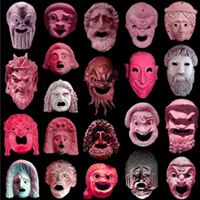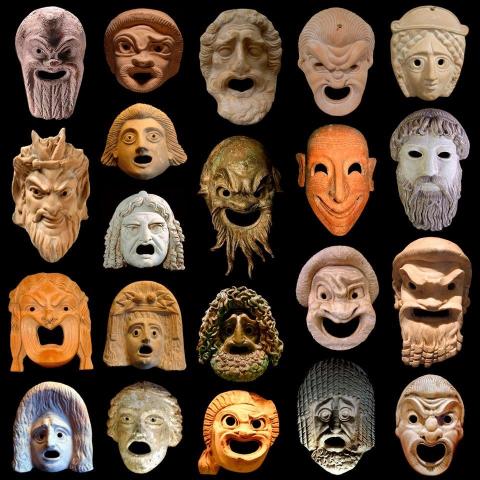
En la cultura estadounidense hay muchos acertijos filosóficos curiosos: ¿Por qué "slow down" (“ir más despacio”) y "slow up" (“apurar el paso”) significan lo mismo? ¿Por qué "fat chance" (“pocas probabilidades”) y "slim chance" (“mínimas probabilidades”) quieren decir lo mismo? ¿Por qué los "tugboats" (remolcadores) empujan las barcazas en lugar de tirarlas? ¿Por qué cantamos "Take me out to the ball game" (“Llévame al partido de béisbol”) cuando ya estamos allí? ¿Por qué decimos "after dark" (“después de la oscuridad”) cuando en realidad es “después de la luz”? ¿No hace “esperar lo inesperado” que lo inesperado deje de serlo? ¿Por qué un "wise man" (sabio) y un "wise guy" (listillo) significan cosas opuestas? ¿Por qué "overlook" (“pasar por alto”) y "oversee" (“supervisar”) son contrarios? ¿Por qué "bra" (sostén) es singular y "panties" (bragas) es plural? ¿Y por qué manejamos por una "parkway" (autopista) y estacionamos en una "driveway" (entrada de casa)?
La presentación de PowerPoint adjunta muestra lo que pensaban distintos filósofos sobre el humor: Platón, Aristóteles, Cicerón, Séneca, Santo Tomás de Aquino, René Descartes, Immanuel Kant, William Spencer, William Hazlitt, Søren Kierkegaard, Friedrich Nietzsche, Sigmund Freud, Henri Bergson, Franz Kafka, Jean-Paul Sartre y Albert Camus.
John Morreall, profesor de Estudios Religiosos en el College of William and Mary, habla sobre las diferencias entre tener una visión cómica o una visión trágica de la vida. También ofrece una lista de diferencias sociales y señala que la mayoría de las religiones “nuevas” promueven la visión cómica:
Antiheroísmo vs. Heroísmo
Pacifismo vs. Militarismo
Perdón vs. Venganza
Igualdad social vs. Desigualdad
Cuestionamiento vs. Aceptación de la autoridad
Ética situacional vs. Ética del deber
Integración social vs. Aislamiento social
Monty Python’s The Holy Grail:
https://www.youtube.com/watch?v=hKNDml12Big
Monty Python’s The Life of Brian:
https://www.youtube.com/watch?v=4HB7zqP9QNo
Monty Python’s The Meaning of Life:
https://www.youtube.com/watch?v=LAwDWZoETk4
Sociedad Internacional para los Estudios del Humor:
http://www.humorstudies.org/
Nilsen, Alleen y Don. El lenguaje del humor: una introducción.
Cambridge, Inglaterra: Cambridge University Press, 2019.
http://www.cambridge.org/core/books/language-of-humor/B37E80D6A21DB3A2E344A4061D996D9C
(This text has been translated into Spanish by Chat GPT)


Humor in Philosophy and Ethics
by Don Nilsen
There are many philosophical conundrums in American culture: Why does "slow down" and "slow up" mean the same thing? Why does "fat chance" and "slim chance" mean the same thing? Why do "tug" boats push their barges? Why do we sing "Take me out to the ball game" when we are already there? Why is it called "after dark" when it is really "after light"? Doesn't "expecting the unexpected" make the unexpected expected? Why are a "wise man" and a "wise guy" opposites? Why do "overlook" and "oversee" mean opposite things? Why is “bra” singular and “panties” plural? Why do we drive on a parkway and park on a driveway?
The attached PowerPoint tells what each of the following philosophers have said about humor: Plato (424-348 BCE), Aristotle (384-322 BCE), Cicero (Born in 106 BCE), Seneca (4 BCE-AD 65), St. Thomas Aquinas (1225-1274 A.D.), René Descartes (1595-1650 A.D.), Immanuel Kant (1724-1804), William Spencer (1769-1834), William Hazlitt (1778-1830), Soren Kierkegaard (1813-1855), Friedrich Nietsche (1844-1900), Sigmund Freud (1856-1939), Henri Bergson, (1859-1941), Franz Kafka (1883-1924), Jean-Paul Sartre (1905-1980), and Albert Camus (1913-1960).
John Morreall, a Professor of Religious Studies at William and Mary College points to the philosophical differences associated with having a Comic Vision vs. a Tragic Vision of Life. He also lists these Social Differences and says that most “new” religions promote the Comic Vision.
Anti-Heroism vs. Heroism
Pacifism vs. Militarism
Forgiveness vs. Vengeance
Social Equality vs. Inequality
Questioning vs. Acceptance of Authority
Situation Ethics vs. Duty Ethics
Social Integration vs. Social Isolation
Monte Python’s The Holy Grail:
https://www.youtube.com/watch?v=hKNDml12Big
Monte Python’s The Life of Brian:
https://www.youtube.com/watch?v=4HB7zqP9QNo
Monte Python’s The Meaning of Life:
https://www.youtube.com/watch?v=LAwDWZoETk4
International Society for Humor Studies: http://www.humorstudies.org/
Nilsen, Alleen and Don. The Language of Humor: An Introduction.
Cambridge, England: Cambridge University Press, 2019.
www.cambridge.org/core/books/language-of-humor/B37E80D6A21DB3A2E344A4061D996D9C
